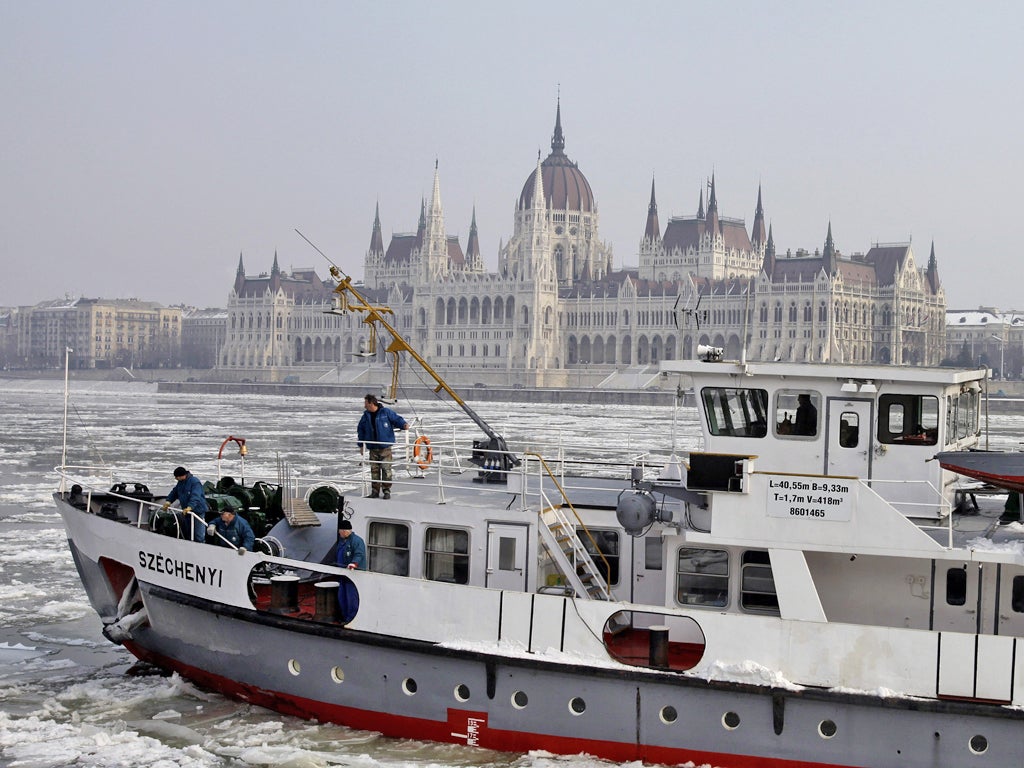Frozen Danube river is costing shippers millions

Your support helps us to tell the story
From reproductive rights to climate change to Big Tech, The Independent is on the ground when the story is developing. Whether it's investigating the financials of Elon Musk's pro-Trump PAC or producing our latest documentary, 'The A Word', which shines a light on the American women fighting for reproductive rights, we know how important it is to parse out the facts from the messaging.
At such a critical moment in US history, we need reporters on the ground. Your donation allows us to keep sending journalists to speak to both sides of the story.
The Independent is trusted by Americans across the entire political spectrum. And unlike many other quality news outlets, we choose not to lock Americans out of our reporting and analysis with paywalls. We believe quality journalism should be available to everyone, paid for by those who can afford it.
Your support makes all the difference.European shippers say they are losing millions because a lengthy stretch of the Danube - one of Europe's key waterways - is stuck in the longest freeze in recent memory.
Huge chunks of ice floated down the middle of the Danube today in southern Romania while water close to the banks remained iced over, with barges, boats and ships tangled in a wintry web.
The Danube flows for 1,785 miles (2,872 kilometers) through nine countries, starting in Germany's Black Forest, before passing through Austria, Slovakia, Hungary, Croatia, Serbia, Bulgaria, Romania, and Ukraine.
The river began to ice over in early February as temperatures plunged to minus 20 Celsius (-4 Fahrenheit). The freeze followed a drought in the fall in which water levels had dropped so low that it was interfering with shipping along the international waterway.
By today, ice had halted shipping on 440 miles (700 kilometers) of the Danube in Romania, an official from the Romanian Transportation Ministry told The Associated Press, speaking on the department's customary condition of anonymity.
The river forms the border between Romania and Bulgaria and six river crossings were also closed due to the ice. Upstream, the river was also iced over in parts in the Serbian capital of Belgrade.
Costache Constantin, manager of Europolis Shipping & Trading shipping company, surveyed the scene from a warm office in the Romanian Black Sea port of Constanta. He said he'd never seen such a drawn-out freeze on the Danube since he began working in the industry in 1981.
"This is costing millions of euros. The transportation of raw materials, coal, minerals, cereals ... are all affected, construction materials too," he said by telephone.
The Constanta port also froze over last week and the dockyard was closed due to icy weather.
Viorel Panait, a manager for Convex SA, a port services company involved in the shipping of iron ore, coal and bauxite, said his firm was busy figuring ways to beat the big freeze. He said 2,000 tons of iron ore was being loaded daily onto trucks, antifreeze was being used to stop the minerals icing up and coal was being transported by train.
"We are functioning. Even if there is a freeze, we are working," Panait said from Constanta.
There were no official figures immediately available for Romania's shipping business, but Panait, who has worked in the industry since 1981 and is one of the country's most experienced shipping agents, estimated that the annual turnover is worth about (euro) 1 billion ($1.32 billion), based on a volume of 20 to 30 million tons of cargo being shipped on Romanian waterways.
However, shippers were complaining that authorities were not doing enough to ease the situation.
"People are trying to break up ice by themselves, which makes it more difficult. When you have ice flows that are 5 to 7 meters (16.5 feet to 23 feet) you need to coordinate to unblock it," said Constantin.
At a ferry crossing in southern Romania, one ship owner was frustrated by the situation.
"Authorities don't have the resources to help us clear the ice and we are left in the hands of fate," ship owner Caius Iliescu said as he struggled to dislodge his iced-locked ship near the village of Chicui.
AP
Join our commenting forum
Join thought-provoking conversations, follow other Independent readers and see their replies
Comments